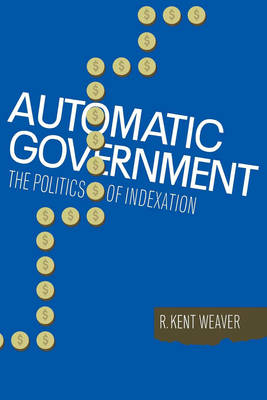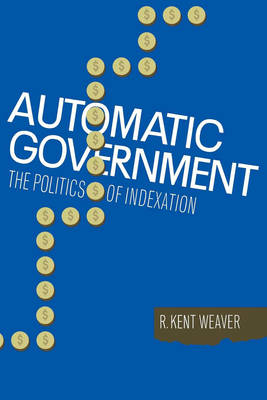
Bedankt voor het vertrouwen het afgelopen jaar! Om jou te bedanken bieden we GRATIS verzending (in België) aan op alles gedurende de hele maand januari.
- Afhalen na 1 uur in een winkel met voorraad
- In januari gratis thuislevering in België
- Ruim aanbod met 7 miljoen producten
Bedankt voor het vertrouwen het afgelopen jaar! Om jou te bedanken bieden we GRATIS verzending (in België) aan op alles gedurende de hele maand januari.
- Afhalen na 1 uur in een winkel met voorraad
- In januari gratis thuislevering in België
- Ruim aanbod met 7 miljoen producten
Zoeken
€ 38,45
+ 76 punten
Omschrijving
One of the most dramatic and least studied policy changes of the past twenty years is the increased use of indexing--automatic adjustments for inflation--in federal programs. Currently, programs comprising more than one-third of the federal budget have indexing provisions. The growth of indexing is all the more remarkable since it appears to conflict with the electoral interests of most politicians. Without indexing, legislators can vote for popular increases in social security benefits, federal pay, and other programs during election years and claim credit with their constituents for doing so. Indexing tends to keep such votes off the agenda. Why would politicians renounce these credit-claiming opportunities instead of embracing them? R. Kent Weaver examines the reasons for the growth of indexing in federal programs and its consequences for current policy. He focuses on indexing debates in six policy areas: social security, food stamps, congressional pay, dairy price supports, the minimum wage, and federal income tax brackets. Weaver argues that to understand indexation policy--and policymaking in general--we must broaden our understanding of policymakers' motivations. They have often given up opportunities to claim credit because they are even more concerned with avoiding blame for unpopular decisions and outcomes. Politicians' efforts to avoid blame for unpopular actions not only have determined whether indexing proposals were adopted, but have also shaped the effects of indexing on programs where it was adopted. Weaver shows that the effects of indexing have varied substantially across programs, and he suggests guidelines for the future use of indexing in federal programs.
Specificaties
Betrokkenen
- Auteur(s):
- Uitgeverij:
Inhoud
- Aantal bladzijden:
- 290
- Taal:
- Engels
Eigenschappen
- Productcode (EAN):
- 9780815792574
- Verschijningsdatum:
- 1/07/1988
- Uitvoering:
- Paperback
- Formaat:
- Trade paperback (VS)
- Afmetingen:
- 152 mm x 229 mm
- Gewicht:
- 385 g

Alleen bij Standaard Boekhandel
+ 76 punten op je klantenkaart van Standaard Boekhandel
Beoordelingen
We publiceren alleen reviews die voldoen aan de voorwaarden voor reviews. Bekijk onze voorwaarden voor reviews.









